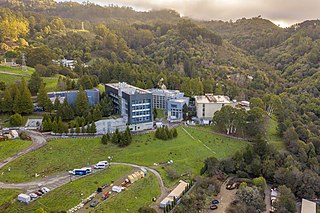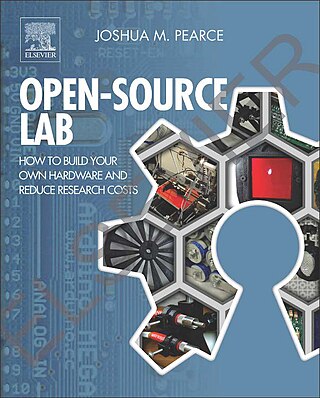
Lawrence Berkeley National Laboratory (LBNL) is a federally funded research and development center in the hills of Berkeley, California, United States. Originally established in 1931 by the University of California (UC), the laboratory is now sponsored by the United States Department of Energy and administrated by the UC system. Ernest Lawrence, who won the Nobel prize for inventing the cyclotron, founded the Lab and served as its Director until his death in 1958. Located in the hills of Berkeley, California, the lab overlooks the campus of the University of California, Berkeley.

A laboratory is a facility that provides controlled conditions in which scientific or technological research, experiments, and measurement may be performed. Laboratories are found in a variety of settings like: schools, universities, privately owned research institutions, corporate research and testing facilities like ones found at pharmaceutical and petrochemical companies, government regulatory and forensic investigation centers, physicians' offices, clinics, hospitals, regional and national referral centers, and even occasionally personal residences.

IBM Research is the research and development division for IBM, an American multinational information technology company headquartered in Armonk, New York, with operations in over 170 countries. IBM Research is the largest industrial research organization in the world and has twelve labs on six continents.

A fab lab is a small-scale workshop offering (personal) digital fabrication.

A hackathon is an event where people engage in rapid and collaborative engineering over a relatively short period of time such as 24 or 48 hours. They are often run using agile software development practices, such as sprint-like design wherein computer programmers and others involved in software development, including graphic designers, interface designers, product managers, project managers, domain experts, and others collaborate intensively on engineering projects, such as software engineering.

Robert Samuel Langer Jr. FREng is an American chemical engineer, scientist, entrepreneur, inventor and one of the nine Institute Professors at the Massachusetts Institute of Technology.

A hackerspace is a community-operated, often "not for profit", workspace where people with common interests, such as computers, machining, technology, science, digital art, or electronic art, can meet, socialize, and collaborate. Hackerspaces are comparable to other community-operated spaces with similar aims and mechanisms such as Fab Lab, men's sheds, and commercial "for-profit" companies.
Do-it-yourself biology is a growing biotechnological social movement in which individuals, communities, and small organizations study biology and life science using the same methods as traditional research institutions. DIY biology is primarily undertaken by individuals with limited research training from academia or corporations, who then mentor and oversee other DIY biologists with little or no formal training. This may be done as a hobby, as a not-for-profit endeavour for community learning and open-science innovation, or for profit, to start a business.

Joshua M. Pearce is an academic engineer at Western University and Michigan Tech known for his work on protocrystallinity, photovoltaic technology, open-source-appropriate technology, and open-source hardware including RepRap 3D printers.
Gregory L. Charvat is author of Small and Short-Range Radar Systems, Co-Founder of Butterfly Network Inc, and advisor to the Camera Culture Group at Massachusetts Institute of Technology MIT Media Lab.

The Open-Source Lab: How to Build Your Own Hardware and Reduce Research Costs by Joshua M. Pearce was published in 2014 by Elsevier.
Ryan Bethencourt is an American scientist, entrepreneur, and biohacker best known for his work as co-founder and CEO of Wild Earth, Partner at Babel Ventures and cofounder and former Program Director at IndieBio, a biology accelerator and early stage seed fund. Bethencourt was head of life sciences at the XPRIZE foundation, a co-founder and CEO of Berkeley Biolabs, a biotech accelerator, and Halpin Neurosciences, an ALS therapeutics-focused biotech company. Bethencourt co-founded Counter Culture Labs, a citizen science nonprofit, and Sudo Room, a hacker space based in downtown Oakland, California.

Hao Li is a computer scientist, innovator, and entrepreneur from Germany, working in the fields of computer graphics and computer vision. He is co-founder and CEO of Pinscreen, Inc, as well as associate professor of computer vision at the Mohamed Bin Zayed University of Artificial Intelligence (MBZUAI). He was previously a Distinguished Fellow at the University of California, Berkeley, an associate professor of computer science at the University of Southern California, and former director of the Vision and Graphics Lab at the USC Institute for Creative Technologies. He was also a visiting professor at Weta Digital and a research lead at Industrial Light & Magic / Lucasfilm.

Jeffrey Michael Heer is an American computer scientist best known for his work on information visualization and interactive data analysis. He is a professor of computer science & engineering at the University of Washington, where he directs the UW Interactive Data Lab. He co-founded Trifacta with Joe Hellerstein and Sean Kandel in 2012.

Cisco DevNet is Cisco's developer program to help developers and IT professionals who want to write applications and develop integrations with Cisco products, platforms, and APIs. Cisco DevNet includes Cisco's products in software-defined networking, security, cloud, data center, internet of things, collaboration, and open-source software development. The developer.cisco.com site also provides learning and sandbox environments as well as a video series for those trying to learn coding and testing apps.
BioCurious is a community biology laboratory and nonprofit organization located in Sunnyvale, California, co-founded by Eri Gentry, Kristina Hathaway, Josh Perfetto, Raymond McCauley, Joseph Jackson, and Tito Jankowski. With the help of Kickstarter and 239 backers they raised $35,319. BioCurious is a complete working laboratory and technical library for entrepreneurs to access equipment, materials, and co-working space, and a meeting place for citizen scientists, hobbyists, activists, and students. Scientific American magazine has described BioCurious as "one of country’s premier community biotechnology labs [...]".
Lina Nilsson is an American biomedical engineer known for her work in technology and entrepreneurship. She was named one of MIT Technology Review's 35 Innovators Under 35 and has been interviewed or profiled by Fortune and the White House's Office of Science and Technology Policy. She has been published in The New York Times, The Washington Post, Science, Make Magazine, and various scientific journals.

Nina Dudnik is an American social entrepreneur, science diplomacy advocate, and the Founder and former CEO of Seeding Labs, a US-based nonprofit organization investing in building scientific capacity in the developing world. Dudnik founded the organization in 2003 as a graduate student studying at Harvard University, where she received her PhD in molecular biology.

David Moinina Sengeh is the Minister of Basic and Senior Secondary Education and Chief Innovation Officer for the Directorate of Science, Technology and Innovation in Sierra Leone. He is a TED Senior Fellow.

Canan Dağdeviren is a Turkish academic, physicist, material scientist, and assistant professor at the Massachusetts Institute of Technology (MIT), where she currently holds the LG Career Development Professorship in Media Arts and Sciences. Dagdeviren is the first Turkish scientist in the history of the Harvard Society to become a Junior Fellow in the Society of Fellows at Harvard University. As a faculty member, she directs her own Conformable Decoders research group at the MIT Media Lab. The group works at the intersection of materials science, engineering and biomedical engineering. They create mechanically adaptive electromechanical systems that can intimately integrate with the target object of interest for sensing, actuation, and energy harvesting, among other applications. Dagdeviren believes that vital information from nature and the human body is "coded" in various forms of physical patterns. Her research focuses on the creation of conformable decoders that can "decode" these patterns into beneficial signals and/or energy.















